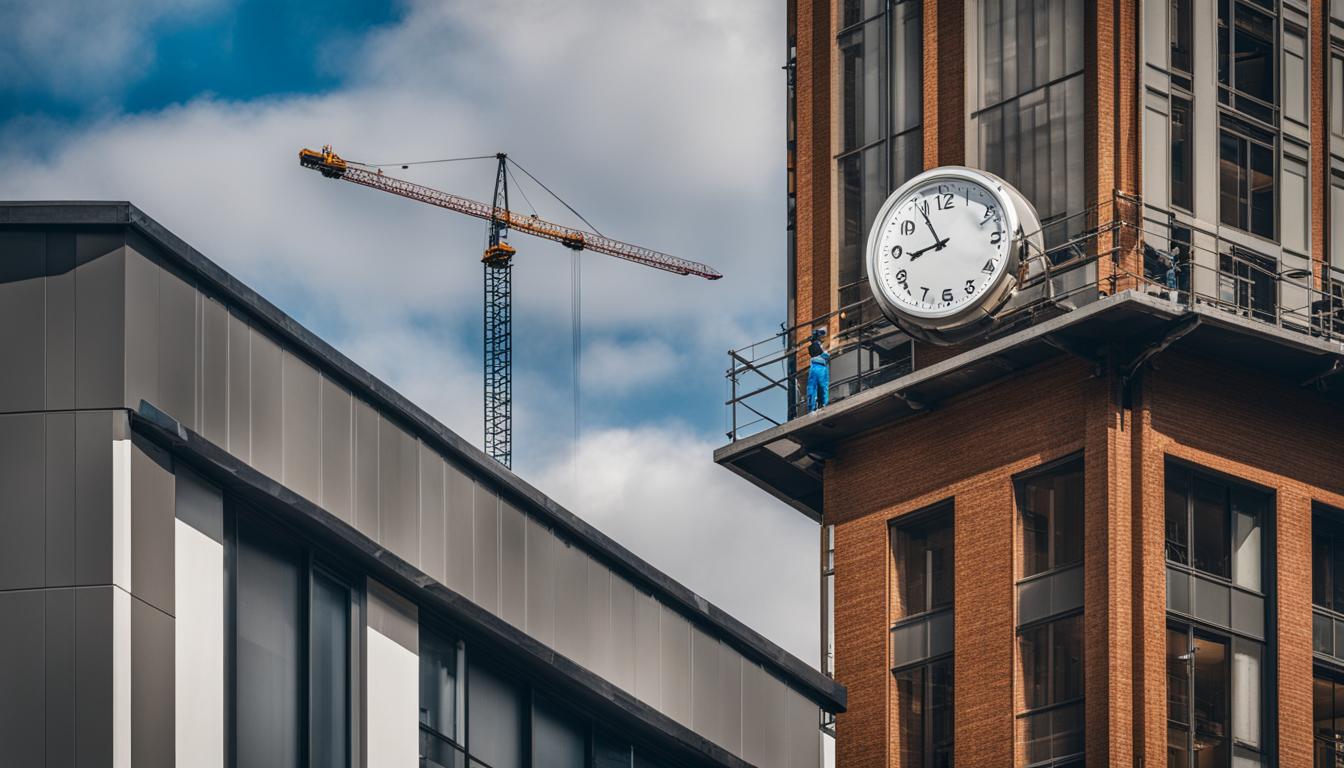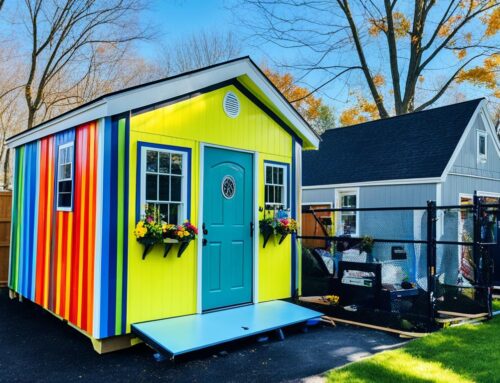Building permits are essential documents for any construction project, granting permission to builders, remodelers, or DIYers to undertake specific home repairs, improvements, or building projects. But have you ever wondered how long a building permit is valid? The duration of a building permit can vary between localities, and understanding its expiration period is crucial to ensure compliance with regulations and avoid potential penalties.
Key Takeaways:
- Building permits are documents issued for home repairs, improvements, or building projects.
- The duration of a building permit varies depending on the locality.
- Expired building permits need to be renewed or extended before work can begin.
- Consult with the local building inspection office to determine permit requirements.
- Traci’s Permits offers expert assistance with building permits on Long Island. Call 631-492-0927.
Understanding Building Permits
Building permits play a crucial role in construction projects, ensuring that the work is done safely and in compliance with building codes. But what exactly is a building permit and why is it necessary?
A building permit is an official document issued by local building inspection offices that grants permission to undertake specific home repairs, improvements, or building projects. These permits are essential for projects where safety is a concern, as they require an authorized inspector’s review.
The purpose of building permits is to ensure that construction work adheres to established regulations and standards, protecting the occupants and the surrounding community. By obtaining a building permit, you demonstrate your commitment to safety and compliance.
The specific requirements for building permits can vary from state to state and even between communities. In some cases, minor repairs may not require a permit or inspection, while major repairs or improvements often do. It is important to understand the regulations in your locality and consult with the local building inspection office to determine the permit requirements for your project.
Not obtaining the necessary permits can have serious consequences. Without a building permit, you may face penalties and fines, and your project may be subject to additional scrutiny during property inspections or resale.
“Building permits ensure that construction projects are done safely and in compliance with building codes, protecting both the occupants and the community.”
If you are unsure whether your project requires a building permit, it is always better to err on the side of caution and consult with the experts. Local building inspection offices can provide guidance and answer any questions you may have about the permit process and requirements.
The Process for Obtaining Building Permits
The process for obtaining building permits can vary depending on your location. Some communities have streamlined processes, while others may require more documentation and inspections. It is important to familiarize yourself with the specific requirements of your local building department.
Traci’s Permits: Expert Permit Assistance for Long Island
For residents of Suffolk County and Nassau County on Long Island, Traci’s Permits offers unmatched expertise in navigating the permit process. We provide comprehensive services to ensure timely approvals and code compliance for various construction projects.
With Traci’s Permits, you can rely on our knowledge of local regulations and extensive experience in dealing with building inspection offices. We understand the importance of obtaining permits promptly and working within established guidelines.
For expert permit assistance in Suffolk County and Nassau County, call Traci’s Permits at 631-492-0927.
Types of Projects Requiring Building Permits
Building permits play a critical role in ensuring safety and compliance in construction projects. Understanding which projects require a building permit can save you time and prevent potential fines or legal issues. Typically, permits are necessary for projects involving electrical, plumbing, or structural work, as these tasks have safety implications.
However, it’s important to note that not all projects require a building permit. Cosmetic work such as painting walls or replacing fixtures usually does not require a permit. The distinction may also be made between repairs and improvements. Projects that add value to a home or significantly alter its structure generally require a permit.
To determine whether a specific project requires a building permit, it’s best to consult the local building inspection office. They have the expertise to guide you through the permit requirements and ensure compliance with the regulations in your area.
Examples of Projects That Require Building Permits:
- Adding or removing walls
- Installing or modifying electrical systems
- Adding or altering plumbing systems
- Constructing or modifying a deck or porch
- Building or remodeling a garage
- Constructing or modifying a fence
- Installing a new HVAC system
Projects That Generally Don’t Require Building Permits:
- Interior painting
- Replacing fixtures like faucets or light fixtures
- Installing new floor coverings (carpet, laminate, tile, etc.)
- Replacing kitchen or bathroom cabinets
- Landscaping or gardening projects
- Minor repairs that don’t alter the structure
Remember, it’s always better to be safe than sorry. If you’re unsure whether your project requires a building permit, consult with the local building inspection office to ensure compliance with the regulations. It’s an essential step in maintaining the safety and integrity of your construction project.
| Projects Requiring Building Permits | Projects Typically Not Requiring Building Permits |
|---|---|
| Adding or removing walls | Interior painting |
| Installing or modifying electrical systems | Replacing fixtures like faucets or light fixtures |
| Adding or altering plumbing systems | Installing new floor coverings (carpet, laminate, tile, etc.) |
| Constructing or modifying a deck or porch | Replacing kitchen or bathroom cabinets |
| Building or remodeling a garage | Landscaping or gardening projects |
| Constructing or modifying a fence | Minor repairs that don’t alter the structure |
| Installing a new HVAC system |
If you have any doubts about whether your project requires a building permit or need expert assistance with the permit process on Long Island, Traci’s Permits can help. We specialize in navigating the complexities of permit requirements in Suffolk County and Nassau County. Contact us at 631-492-0927 for reliable permit assistance.
Building Permit Expiration and Renewal
Building permits are essential documents that allow construction projects to proceed legally and in compliance with building codes and regulations. However, these permits have expiration dates, and it is crucial to understand the timeframe for expiration in your jurisdiction to avoid any complications.
In general, a building permit will expire if the work it covers does not begin within 6 months or is not completed within 1 year from the date of issuance. This expiration policy ensures that construction projects are completed within a reasonable timeframe and prevents permits from being held indefinitely without any progress.
Renewing or extending an expired building permit is possible, but it is advisable to obtain the permit as close as possible to the start of the intended work. This helps avoid unnecessary delays and ensures that your project complies with all applicable regulations.
Renewing or extending a building permit may involve additional paperwork and fees, which may vary depending on your locality. It is important to consult with the local building inspection office to understand the specific requirements and procedures for renewal. By adhering to these guidelines and proactively managing your building permit, you can avoid unnecessary penalties or complications that may arise from an expired permit.
| Building Permit Expiration | Renewal Process |
|---|---|
| If work does not begin within 6 months or is not completed within 1 year from the date of issuance | Obtain the permit as close as possible to the start of the intended work |
| Renewal may involve additional paperwork and fees | Consult with the local building inspection office for specific requirements |
By staying informed about building permit expiration and following the necessary steps to renew or extend your permit, you can ensure that your construction project remains compliant and on track. Remember to consult with professionals, such as the experts at Traci’s Permits, who can provide valuable guidance and assistance throughout the permit renewal process.
Traci’s Permits offers unmatched expertise with the Long Island permit process, specializing in Suffolk County and Nassau County. For expert permit assistance, you can contact Traci’s Permits at 631-492-0927.
Responsibilities for Obtaining Building Permits
When it comes to obtaining building permits, the responsibility often falls on the contractor hired for the project. Contractors are typically responsible for applying for permits and arranging inspections as part of their services. They have the knowledge and expertise to navigate the permit application process and ensure compliance with local building codes.
As a DIYer, the responsibility for obtaining building permits lies with you. It is essential to understand the permit requirements specific to your project, follow code regulations, and ensure that inspections are completed within the specified timeframe. Failure to obtain the necessary permits can lead to penalties, fines, and potential complications during property inspections or resale.
“When hiring a contractor, it is crucial to clarify the responsibilities for permit applications and fees before starting the project.”
Traci’s Permits offers unmatched expertise in navigating the permit process, especially in Suffolk County and Nassau County on Long Island. We ensure timely approvals and code compliance, taking the burden off your shoulders. For expert permit assistance, contact Traci’s Permits at 631-492-0927.
Building Permit Process in Specific Locations
The process for obtaining building permits may vary depending on the specific location. In Nassau County and Suffolk County on Long Island, Traci’s Permits offers unmatched expertise in navigating the permit process and ensuring timely approvals and compliance with building codes.
Traci’s Permits specializes in providing reliable permit assistance for building projects in Nassau County and Suffolk County. Our team is well-versed in the local regulations and requirements, making the permit process seamless for our clients.
With Traci’s Permits by your side, you can trust that your building permits will be obtained efficiently, minimizing any potential delays or complications. Our experts handle all the necessary paperwork and communicate with the local building inspection offices on your behalf, ensuring a smooth and hassle-free permit process.
To benefit from our expertise and experience in obtaining building permits in Nassau County and Suffolk County, contact Traci’s Permits today at 631-492-0927.
Testimonial from a Satisfied Customer
“Traci’s Permits went above and beyond to help me navigate the building permit process. Their knowledge of local codes and regulations ensured that I obtained the necessary permits without any hassle. I highly recommend their services to anyone undertaking a construction project in Nassau County or Suffolk County.”
Benefits of Working with Traci’s Permits
- Expertise in the building permit process in Nassau County and Suffolk County
- Timely approvals and compliance with building codes
- Efficient handling of paperwork and communication with local building inspection offices
- Minimized delays and complications in obtaining permits
- Exceptional customer service and support throughout the permit process
Summary of Building Permit Process in Nassau County and Suffolk County
| Step | Process |
|---|---|
| 1 | Consultation with Traci’s Permits to assess permit requirements |
| 2 | Gathering of necessary documentation for permit application |
| 3 | Submission of permit application to the local building inspection office |
| 4 | Coordination with the building inspection office for review and approval |
| 5 | Obtaining the approved building permit |
Factors Affecting Building Permit Costs
When planning a construction project, it’s important to consider building permit fees as part of your budget. The cost of building permits can vary depending on several factors, including:
- The projected cost of your project
- The square footage of the area being worked on
- Local regulations and ordinances
Some communities calculate permit fees based on the estimated project cost, while others use a per square foot basis. Understanding how your local jurisdiction determines permit fees is crucial to accurately budgeting for your project.
In addition to project cost and square footage, the type of project (residential, commercial, agricultural) may also impact permit costs. Special considerations, such as construction in critical areas or environmentally sensitive zones, may result in additional permit fees.
By taking these factors into account, you can avoid unexpected expenses and ensure that your project remains within budget. It’s always a good idea to consult with your local building inspection office to understand the specific permit fee structure and any potential cost-saving strategies.
Table: Building Permit Fee Factors
| Factor | Description |
|---|---|
| Projected Project Cost | The estimated total cost of your construction project |
| Square Footage | The size of the area being worked on |
| Local Regulations | Specific building codes and ordinances in your location |
| Type of Project | Residential, commercial, or agricultural construction |
| Special Considerations | Construction in critical areas or environmentally sensitive zones |
When it comes to building permit costs, it’s essential to be prepared and factor them into your overall project budget. By understanding the various factors that can impact permit fees, you can ensure a smoother construction process and avoid any surprises along the way.
For expert assistance with building permits in Suffolk County and Nassau County, you can rely on Traci’s Permits. Our team offers unmatched expertise in navigating the permit process, ensuring timely approvals, and complying with local building codes. Contact Traci’s Permits at 631-492-0927.
Timelines for Obtaining Building Permits
The timeline for obtaining building permits can vary depending on the complexity of the project and the specific location. Here’s a general guideline to help you understand the processing times involved:
Easy Permits:
Easy permits, which typically involve minor repairs or cosmetic changes, can often be obtained on the same day through the city’s online permit portal or in-person at the local building inspection office. These permits are usually approved quickly as they do not require extensive review or inspection.
Standard Permits:
Standard permits for more complex projects, such as major renovations or new construction, may take longer to process. On average, these permits can take up to 12 weeks for approval. The processing time can be influenced by factors like the workload of the building inspection office, the completeness of the permit application, and the need for additional documentation or review.
To ensure a smooth and timely process, it is advisable to apply for a building permit as soon as possible after finalizing your project plans. By starting the permit application process early, you can account for any potential processing delays and ensure that your permit is obtained in a timely manner.
| Type of Permit | Processing Time |
|---|---|
| Easy Permits | Same day |
| Standard Permits | Up to 12 weeks |
Remember, processing times may vary depending on the specific requirements of your project and the jurisdiction you are in. It is always best to consult with your local building inspection office for the most accurate information.
If you’re located in Suffolk County or Nassau County on Long Island, Traci’s Permits can offer unmatched expertise in navigating the permit process. We ensure timely approvals and code compliance, making the permit acquisition hassle-free for you. For expert permit assistance, contact Traci’s Permits at 631-492-0927.
The Importance of Building Permits
Building permits play a crucial role in ensuring the safety and compliance of construction projects. They are essential for protecting homeowners and ensuring that the work is done properly, adhering to building codes and regulations.
One of the main benefits of obtaining building permits is that they provide a record of completed work. This record can be valuable when selling a property, as potential buyers can see that all the necessary permits were obtained and the work was done according to regulations.
Without a building permit, homeowners may face various issues and complications. Firstly, there is the risk of fines and increased fees if it is discovered that work was done without the required permits. Additionally, when it comes time to sell the property, the absence of proper permits may raise red flags during property inspections and negotiations. This can potentially delay or even jeopardize the sale.
By following the proper permit process, homeowners can avoid these complications and ensure the long-term integrity of their construction projects. Building permits provide assurance that the work meets safety standards, protecting both the homeowner and future occupants of the property.
“Building permits are crucial for ensuring that construction projects are done safely, adhering to building codes and regulations. They provide peace of mind and protect homeowners from potential legal and financial consequences.”
Traci’s Permits: Expert Assistance for Long Island
Building Permit Process
If you’re planning a construction project in Suffolk County or Nassau County on Long Island, Traci’s Permits can provide unmatched expertise in navigating the permit process. With our assistance, you can ensure timely approvals, code compliance, and a smooth permit application experience.
| Why Choose Traci’s Permits? | Contact Information |
|---|---|
|
For expert permit assistance in Suffolk County and Nassau County, contact Traci’s Permits: Phone: 631-492-0927 |
Conclusion
Obtaining and complying with building permits is crucial for any construction project. Building permits serve as a vital safeguard, ensuring that construction work is done safely and in compliance with building codes and regulations. It is imperative to understand the specific requirements and regulations in your area to avoid potential penalties and complications.
Building permits have expiration dates, typically ranging from 6 months to 1 year, depending on the jurisdiction. It is essential to obtain the permit within the specified timeframe before commencing work. Failure to do so may result in delays and additional fees. Therefore, it is crucial to plan your project accordingly and start the permit application process as soon as possible.
If you are navigating the complex world of building permits in Suffolk County or Nassau County on Long Island, Traci’s Permits is here to help. With unmatched expertise and a deep understanding of the local permit process, we ensure timely approvals and code compliance. For expert permit assistance, contact Traci’s Permits at 631-492-0927.
FAQ
How long is a building permit valid for?
The duration of a building permit can vary depending on the jurisdiction. Generally, building permits are valid for a period of 6 months to 1 year.
What is a building permit?
A building permit is a document issued by local building inspection offices that allows individuals to undertake certain home repairs, improvements, or building projects. It ensures compliance with building codes and regulations.
What types of projects require building permits?
Building permits are usually required for projects involving electrical, plumbing, or structural work. Cosmetic work such as painting or replacing fixtures typically does not require a permit.
When does a building permit expire?
A building permit usually expires if the work it covers does not begin within 6 months or is not completed within 1 year from the date of issuance. It may be possible to renew or extend an expired building permit.
Who is responsible for obtaining building permits?
If you hire a contractor, they are usually responsible for obtaining permits and arranging inspections. However, if you are a DIYer, you are responsible for understanding the permit requirements, following code regulations, and ensuring inspections are completed within the specified timeframe.
What is the building permit process in Nassau County?
The building permit process in Nassau County may vary depending on the specific location. It is recommended to consult with the local building inspection office or seek assistance from experts like Traci’s Permits for guidance and assistance.
What factors affect building permit costs?
Building permit costs can vary based on factors such as the projected project cost, square footage, and locality regulations. The type of project (residential, commercial, agricultural) and any special considerations (critical areas) may also impact permit costs.
How long does it take to get a building permit?
The timeline for obtaining a building permit can vary depending on the complexity of the project and the specific location. Easy permits can be obtained on the same day, while standard permits may take up to 12 weeks for approval.
What are the benefits of obtaining building permits?
Building permits ensure that work is done safely and in compliance with building codes. They provide a record of completed work and can be valuable when selling a property. Without a building permit, homeowners may face fines, increased fees, and potential issues during property inspections or resale.
Summary of building permit duration:
Building permits are valid for 6 months to 1 year and should be obtained within a specific timeframe before work begins. It is important to understand the regulations in your area, consult with local building inspection offices, and consider expert assistance like Traci’s Permits to navigate the permit process and ensure timely approvals.












